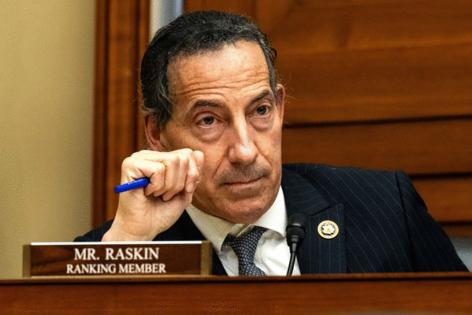For the pups, Maryland Rep. Jamie Raskin hopes food bill finds a way
Published in Political News
WASHINGTON — There’s a wide divide between Republicans and Democrats in Congress. Maybe dogs can bridge the gap?
Rep. Jamie Raskin, a Maryland Democrat, will reintroduce a bill on Wednesday that would allow pet stores to donate expired food and kibble to animal shelters. Rep. Young Kim, a California Republican, will join as its Republican sponsor. The legislation’s Senate companion is expected to be reintroduced by Sen. Raphael Warnock, a Georgia Democrat, and Sen. Thom Tillis, a North Carolina Republican.
“Every day, viable pet food goes to waste and blankets, crates and other supplies end up in the trash,” Raskin told The Baltimore Sun in a statement. “Our legislation helps suppliers and people donate leftover food and supplies rather than toss them out. I’m glad to partner with Rep. Kim to ensure perfectly good pet supplies go to shelter animals in need.”
Appropriately titled the Bring Animals Relief and Kibble (BARK) Act, the idea originated from a constituent after she spent years watching an employer dump millions of pounds of pet food in the garbage, rather than donating it to shelters, for fear of potential litigation.
“We’re really hoping we can get this thing passed,” Sally Tom, a Silver Spring resident, said. “It’s kind of a no-brainer.”
Congress is full of common-sense solutions that are rarely implemented. Thousands of bills are introduced each session, and most of them never receive a vote on the House floor. That’s particularly the case when a bill is introduced by a lawmaker in the minority party, like Raskin.
But his office remains optimistic, despite the less-than-ideal circumstances the bill faces, that it can be passed this session.
“The bill has strong bipartisan support,” an office spokesperson said. “We expect to add more co-sponsors of both parties to the bill once we introduce.”
The legislation has a few things in its favor. It already has the backing of two key Republicans — a frontline House member in Kim and an influential senator in Tillis. It would now function as a standalone law, differing from previous versions that would have amended a current law. And, most importantly, it concerns man’s best friend. Who doesn’t love dogs?
“It’s helping shelter animals get food and supplies that they need,” the spokesperson said. “Especially at a time where shelters across the country are facing rising operation costs, it should be bipartisan common sense.”
The current atmosphere of the Republican-controlled Congress (specifically the House) means getting anything passed is an uphill battle — even legislation on dogs. While President Donald Trump has blitzed through hundreds of executive orders, the House has hardly done anything since passing a government funding bill in March. Until recently, it had been bogged down with a large spending bill that contained most of Trump’s legislative agenda. The House passed the bill in late May.
“Why is it not already passed? Because this is the U.S. Congress,” Tillis told The Sun, adding that he’s optimistic it passes this session. “I’ve seen I don’t know how many bills like that take two or three Congresses to get done. It’s just a matter of timing, prioritization. People are distracted by other things, so it’s on me and the co-sponsors to keep pressing the issue.”
It’s possible that the Senate could eventually pass the bill via unanimous consent, if no member objects on the floor. The bill would still have to pass the House and be signed by the president to become law.
Tom, 75, loves dogs. She has a five-year-old Golden Retriever named Angus and previously cared for three rescues — Robbie, Meggie and Mackenzie. It bothered her to see large quantities of seemingly OK pet food being thrown away at the store where she worked.
“And when I asked the manager, ‘Why do we throw all this stuff away when it’s perfectly usable?’” the manager told her it was either past the sell-by date or returned, Tom said. In either case, they couldn’t sell it.
Tom asked about donating it to a shelter. Her manager said that if they did donate it, and an animal happened to get sick, the store could be sued by the shelter or rescue group that received it.
“So it was a liability issue,” Tom said.
But a lawyer friend who previously worked on Capitol Hill suggested that Congress could fix that. The friend cited a 1990s law that protected restaurants and caterers who donate food to people in need.
“If it can be done for human food, certainly it can be done for animals,” Tom said.
In February of 2020, she visited Raskin. His staff crafted the bill, and Raskin introduced it for the first time.
“The idea of all these millions of pounds of kibble — not to mention everything else — going in a landfill every year is just horrifying,” Tom said.
---------------
©2025 The Baltimore Sun. Visit at baltimoresun.com. Distributed by Tribune Content Agency, LLC.

























































Comments